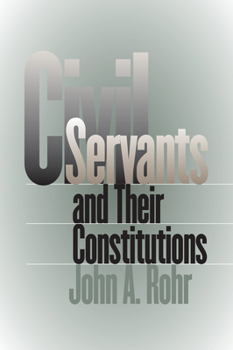Civil Servants and Their Constitutions
Public administration as an American profession originated in the early twentieth century with urban reformers advocating the application of scientific and business practices to rehabilitate corrupt city governments. That approach transformed governance in the United States but also guaranteed recurrent debate over the proper role of public administrators, who must balance the often contradictory demands of efficiency and politically defined notions of the public good. Currently the business approach holds sway. Legitimated by Al Gore's National Performance Review, the New Public Management movement promotes entrepreneurs over civil servants, performance over process, decentralization over centralization, and flexibility over rules. John Rohr demurs, arguing that the movement goes too far in downplaying the distinctively American challenges arising from the separated powers principle. Consequently, the NPM alienates public management from its natural home--a nation-state established within a constitutional order. According to Rohr, "nothing is more fundamental to governance than a constitution; and therefore to stress the constitutional character of administration is to establish the proper role of administration as governance that includes management but transcends it as well." This is not a novel argument for Rohr, who was recognized in 1999 by the Louis Brownlow Committee of the National Academy of Public Administration for his lifetime contributions on the "constitutional underpinnings" of public administration. But this new version of his rule-of-law critique directly addresses the NPM's excesses, framed convincingly as a comparative study of cases found in four countries spanning three centuries. As a result, Rohr establishes that the constitutional-administrative nexus is intimate, stable, pervasive, and enduring. The first half of the book examines the linkages between constitutions and administrations in France, the United Kingdom, and Canada, all of them sufficiently similar to the United States to make comparisons meaningful and sufficiently different to provide illuminating perspectives on domestic practices. The examples extend from the French Revolution through the founding of the Canadian Confederation in the 1860s to such contemporary issues as the influence of administrative directives from Brussels on the British courts. The second half of the book examines American cases in three categories: separation of powers, individual rights, and federalism. In each case Rohr highlights instances of public management "with all its warts and wrinkles tending to the mundane details of translating great constitutional principles into everyday actions." American administrative law, Rohr concludes, has structured safeguards to protect the integrity of administrative decision-making while also holding it accountable. Constitutional law has helped establish civil servants' freedom of speech and applied the fundamental principles of federalism to the administrative process. He summarizes his findings from the case studies by saying that the constitutional role of American civil servants comes not only from specific American experiences but also from the very nature of civil service.
Format:Paperback
Language:English
ISBN:0700611630
ISBN13:9780700611638
Release Date:April 2002
Publisher:University Press of Kansas
Length:222 Pages
Weight:0.75 lbs.
Dimensions:0.6" x 6.1" x 9.0"
Customer Reviews
0 rating





